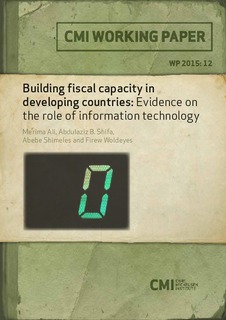| dc.contributor.author | Ali, Merima | |
| dc.contributor.author | Shifa, Abdulaziz B. | |
| dc.contributor.author | Shimeles, Abebe | |
| dc.contributor.author | Woldeyes, Firew | |
| dc.date.accessioned | 2018-01-04T08:20:10Z | |
| dc.date.available | 2018-01-04T08:20:10Z | |
| dc.date.issued | 2015-11-01 | |
| dc.identifier | oai:www.cmi.no:5675 | |
| dc.identifier.citation | Bergen: Chr. Michelsen Institute (CMI Working Paper WP 2015:12) | |
| dc.identifier.isbn | 82-8062-566-3 | |
| dc.identifier.issn | 0804-3639 | |
| dc.identifier.uri | http://hdl.handle.net/11250/2475075 | |
| dc.description.abstract | Limited fiscal capacity poses a significant challenge in developing countries. To mitigate this challenge, the adoption of electronic tax systems has been at the forefront of tax reforms; however, there is little systematic empirical evidence on the impact of such reforms. We attempt to narrow this gap by documenting evidence from Ethiopia where there has been a recent surge in the use of electronic sales registry machines (ESRMs). Using administrative data covering all business taxpayers, we find that ESRM use resulted in a large and significant increase in tax payments. Moreover, this effect is driven by firms that were more likely to evade taxes prior to ESRM use. The results highlight the potential role that information technology may play in strengthening state fiscal capacity in developing countries. | |
| dc.language.iso | eng | |
| dc.publisher | Chr. Michelsen Institute | |
| dc.relation | CMI Working Paper | |
| dc.relation | WP 2015:12 | |
| dc.relation.ispartof | CMI Working Paper | |
| dc.relation.ispartofseries | CMI Working Paper WP 2015:12 | |
| dc.relation.uri | https://www.cmi.no/publications/5675-building-fiscal-capacity-in-developing-countries | |
| dc.subject | Developing Economy | |
| dc.subject | Fiscal Capacity | |
| dc.subject | Information Technology | |
| dc.subject | Taxation | |
| dc.title | Building fiscal capacity in developing countries: Evidence on the role of information technology | |
| dc.type | Working paper | |
